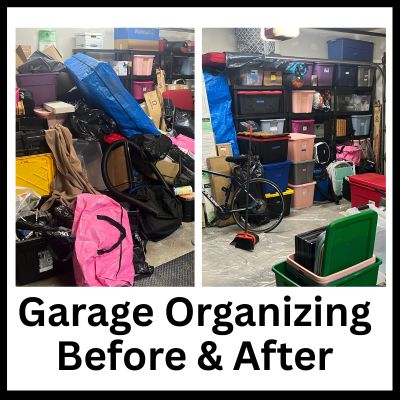Leadership and Home Organization

As you probably know by now, I am an avid Toastmaster. In addition to being plain old FUN, I have learned so much through my participation with this organization. One of the biggest things I’ve been able to improve on are my leadership skills. Since I’ve joined Toastmasters and taken on a variety of leadership roles within the organization (club President, Area Director, and other officer roles), I have developed the courage and skills to be the President of the Seattle Area National Association of Productivity and Organizing Professionals, and taken on several other board positions over the years (currently Professional Development Director). In another larger networking group I’m a part of, I have also been the Vice President, head of the membership committee. These have been big roles, and I credit Toastmasters with giving me the education and experience to be able to take on these positions.
But what does being a leader have to do with home organization? The answer is both internal and external. Internally, when you have multiple different voices competing to be the boss, the results are incongruent, out of harmony, and disagreeable. For example, during a Nyabinghi drum session, when the drummers are competing for the spotlight by trying to show off their skills, you may hear someone call out “one voice”, so that the lead drummer can be heard. Think about your internal boss. Who’s in charge? If your boss is constantly being undermined while simultaneously questioning your choices, this is a recipe for confusion and discord. Procrastination and indecision set in. This gets reflected in your outer environment. Projects go unfinished, decisions go unmade, and the environment lacks and overall cohesiveness. Items are left around “just in case” because you cannot trust “the boss”, and you constantly second guess your decisions. Your intuition gets overridden by intellect, and there is just way to much stuff in your house! You can’t let go of anything, whether it be physical objects or things people say or do. Externally, a good leader in a home can communicate well with others living in the home. They know how to verbalize their desires, how to listen, and how to create a good home organization management plan that involves everyone. Quite often, I get requests to help people delegate and communicate household responsibilities. Differing levels of home organization can be something that puts a lot of strain on marriages, on families, and on roommates. Learning to communicate well is the first step to good household management.
What is a good leader? I’ll break it down into 6 parts for you:
Vision and Values
Good leaders can imagine what they’d like to have happen, can understand present circumstances, and can decide what needs to happen to turn their vision into existence. They can also communicate their vision to others so that they can effectively enlist their help and support. Leaders can also identify their own values, and can live out these values through what they say and do. Leaders know what they want to accomplish and how others will contribute. They are knowledgeable about the pulse of what’s going on in current events. They also connect with other leaders in their field, and will seek out input and alternative viewpoints from others that they respect. In a home, a good leader can develop a plan for how they’d like the home to function, and how it needs to be organized. They take into account the circumstances of what’s going on in the lives of the people that live in the home, and also what’s going on in the neighborhood, city, state, country, and world events that may have an impact on the home projects. This means understanding work schedules, responsibilities, health issues, and skill levels for people living in the home. It also means understanding economic, political, social, and environmental issues that may impact what goes on at home. They communicate their values to themselves and to the people who share the dwelling. Good home leaders will develop connections with others who are skilled at running a household, and will read books, blogs, magazines, and other media so that they can stay current with fresh homemaking ideas.
Direction
Leaders set goals, identify priorities, recruit help, and delegate responsibilities when necessary. People generally work better when they have specific results to achieve. They also know they can’t do everything on their own, so they delegate as needed, and communicate priorities so that others can be productive. Clarifying what responsibilities go to who is invaluable to prevent a shirking of responsibilities. This type of avoidance and blame can wreak havoc on a home. Creating a list of chores and asking others to commit to their own responsibilities is a way to make expectations clear, and results specific to achieve. Even if you’re living alone, delegating chores such as the trash to get picked up once a week, hiring a cleaning company, roof and gutter maintenance, and lawn care can all count towards delegating responsibilities.
Persuasion
Once you’ve created a vision for your organized home, being able to persuade others to see, understand, and believe in their vision is paramount. When others can believe in your vision, they are more likely to commit themselves to achieve the desired outcome. A leader projects self-confidence, so that their team members will trust their leader. When you express your vision with clarity, comfort, and a calm confidence, others will feel inspired to contribute. The leader also needs to be able to communicate the bigger picture. Control freaks are the ones who direct small tasks, but refuse to articulate the larger vision for the project. Letting others in on the big picture helps them feel like they’re in the inner circle, and helps them understand the purpose for the smaller tasks. Keeping others informed of progress and new developments also feeds into the sense of inclusion rather than creating distance by exclusion to ideas.
A good home leader will be able to enlist the help of others by projecting a sense of calm confidence, rather than strict dictatorship, or a passive laissez faire attitude. They call attention to home organization goals while projecting the larger vision and motivating factors for putting the energy into the work it takes to maintain the organization of a home. They listen effectively, make time to communicate one-to-one, can clearly express their ideas, and put others at ease. They also help others express themselves clearly by listening patiently and responding supportively. This fosters an environment where people feel comfortable coming to the leader and communicating honestly and consciously, rather than avoiding communication or hiding feelings. Most importantly, a good leader follows through. They do what they say they will do, which promotes credibility. By following through with what they say they will do, others will mirror that behavior and will follow through as well.
Support
To function well as a team (either a 1 person “internal team” or as a group), it’s important to start off equipped with the right resources so that tasks can be accomplished. For example, if you’re going to organize your garage, sorting and purging items are usually the first tasks to be accomplished. Good leaders will support their team with the proper boxes, bags, and bins so that sorting and purging can be done in an organized way. When it comes to containerizing and finding homes for items, good leaders make sure the proper shelves are in place, and have the sufficient bins and labels for the items to be kept. When problems arise, such as a shelf that isn’t secured properly or a broken bin, leaders provide the assistance to be able to troubleshoot and problem solve. Leaders monitor progress so that they can detect problems early. They meet with the team regularly to make sure progress is being made. Leaders use resources wisely, such as people, money and equipment. They are able to make the most from the resources they have. They are creative thinkers and problem solvers, so they can analyze problems (both intuitively and logically) to produce imaginative solutions. Good time management is also an important skill for a successful leader. Rather than going down the rabbit hole of sorting minutia, or fiddling with something for so long so that they can achieve “perfection”, good leaders know how to give their attention to what is most important.
Development
Leaders know that their team will be most invested when they are gaining something from the work they are doing. They help team members identify their personal needs and goals so that they can provide opportunities to help fulfill their goals. They challenge their team members to learn new skills and inspire them to do their best work. They set a high standard of excellence. For example, a good home organization leader will help the members of the household develop their own personal style, and identify personal goals to work towards. This allows them to optimize their environment so that achieving those goals becomes inevitable. They teach, coach, and gently guide household members when they need help, to learn new skills, or simply need a gently nudge. They generate enthusiasm by building team spirit.
Appreciation
Psychologist William James said, “The deepest craving in human beings is the need to be appreciated.” Everyone needs respect and recognition. Good leaders know how to deliver recognition without being manipulative or sounding patronizing. They acknowledge team members for their efforts and accomplishments. They give praise and positive recognition through verbal appreciation and also smiles and warm gestures so that they feel welcome. They respect the ideas and opinions of others, and encourage team members to make contributions through creating a safe and supportive atmosphere to do so. They use rituals, celebrations, and ceremonies to recognize others and to thank them for their work. Sometimes praise can be accompanied by sarcasm or a belittling attitude, like “good job making your bed, but you should have been doing that all along.” Or, “Thanks for doing the dishes for once!”. These types of nasty comments are not a sign of a good leader. Good leaders know how to genuinely thank someone for a job well done.
Do you want to have fun, make some awesome friends, and build communication and leadership skills so that you can live in an organized house? Please join me for a Toastmasters Open House, Tuesday, May 4th, 2021.
Meeting Time: Tuesday, May 4th, 2021, from 7:30-8:30pm
Meeting Location: Online! We meet via Webex (not Zoom). Here’s the link: http://bit.ly/SnoqualmieTM
Club meetings will continue to be Tuesday evenings from 7:30-8:30pm, so if you can’t make the open house, please join us for another meeting. You can learn more about the club here.
Would you like to learn about more Toastmasters events? Send me a message, I’ll be happy to keep you in the loop!
Want to read another blog post about Toastmasters and organization? Check out this post from 2017 or this more recent one.

By Jean Prominski, Certified Professional Organizer
Download my free 5 week journal The Seattle Sparkle Method to Get Organized and Stay Organized
Sign up for my free 4 Day Color to Declutter Challenge.
Become part of a like-minded community by joining my Facebook Group, Declutter and Organize with Seattle Sparkle.
Ready to book a consultation? Complete this form.
For artwork to energize your home, order through jeanprominski.com or on Etsy.




